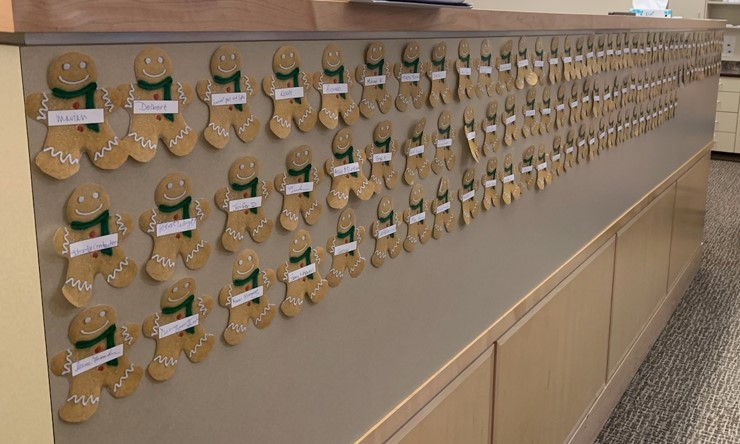The Bottom Line
Small business is important to Central Oregon, and to Mid Oregon. Find tips and resources for business, and information about Mid Oregon’s commercial services and business members.

Shopping Securely Online- Ten tips
Keep your finances safe from sneaky scammers this holiday season.
It seems just couple of years ago, consumers were skeptical about shopping online, but today, shopping online for everything from groceries to televisions has become the norm. But it comes with some risk. The FBI Internet Crime Report shows that cybercriminals were responsible for $4.1 billion in losses in 2020, with Business Email Compromise (BEC) schemes being the costliest for online shoppers. With holiday shopping just around the corner, cybersecurity is — and should be — a top concern for consumers. Here are 10 tips to keep your data safe while shopping securely online:
- Beware of online deals that seem too good to be true. This is especially important on social media. Many times scammers set up fake shopping sites in order to steal your personal information and your money.
- Be smart about site security. Check to ensure that the site you’re purchasing from has encryption that guards your information. Look at the URL, which should read HTTPS instead of only HTTP. The “S” at the end indicates the site has secure socket labels. You’ll also see a lock at the left of the URL, which is standard for all secure sites. The Google Chrome browser flags any site that is not secure, with the HTTPS designation, and sends a warning message to the user.
Email Scams Too Good to be True
- Be wary of email scams offering amazing bargains. And be careful of claims that there’s a problem with delivery, especially if you’re unfamiliar with the sender. Never open attachments or click links that are included in the email unless you can verify the sender is legitimate.
- Avoid shopping while connected to public Wi-Fi — it’s a sure way for hackers to spy for your online activity and gain access to your personal information. Shopping securely online is hard to do on public Wi-Fi.
- Whenever possible, buy with a credit card, not a debit card. Most credit cards offer $0 liability for account fraud, while a debit card gives shady sellers direct access to your bank account.
- Guard your sensitive personal information. No legitimate online retailer will ever ask for your Social Security number. If they do, it’s a major red flag.
Preventing Identity Theft Webinar
Join us for a FREE webinar, Preventing Identity Theft, presented by the Deschutes County Sheriff’s Office Digital Forensics Team. It will be held Thursday, December 9 at 10 a.m. Register for this virtual workshop, and learn how to recognize potential scams, the ploys suspects use to gain personal information, and common-sense steps you can take to protect your identity.
- Pay close attention to the details of the transaction, such as shipping notices and tracking information. If a retailer refuses to give details about your order, such as a shipping date or order status, chances are you may not receive the merchandise. Report the charge to your credit card company to get your money back.
- Check your accounts regularly to ensure that all charges are purchases you actually made. If you see a charge you don’t recognize, notify your credit union or credit card company immediately.
- Choose strong and unique passwords for your online accounts. Never use your or family members’ birthdates, addresses, or other personal information that scammers can easily find online. Combine letters, numbers, and special characters to create complex passwords that are difficult to hack. This is key to shopping securely online.
- Report suspicious activity or file a scam complaint with the U.S. Federal Trade Commission and the FBI’s Internet Crime Complaint Center at https://www.ic3.gov/. You’ll be helping to keep yourself and fellow citizens safe against present and future scammers.
Get the Latest Information
Want to keep up with the latest security information? Visit our Security and Fraud Prevention page. There you can view the latest articles, search by topic, and sign up for ongoing Stickley on Security emails.
Read more Mid Oregon View articles about security and shopping securely online.

Holiday Dough Shows Local Generosity
Mid Oregon’s Annual Holiday Dough
Each year, Mid Oregon Credit Union’s annual fundraiser, Holiday Dough shows local generosity, of our members and Central Oregon. In 2020 almost $9,000 was raised, the most ever. This year, we are on pace to exceed that amount, with two weeks to go!
Mid Oregon Credit Union is encouraging the communities we serve to contribute to our annual fundraiser, Holiday Dough supporting local charities. The chosen Central Oregon organizations provide food, clothing and shelter for individuals and families in greatest need during the holidays.
If you haven’t already donated, it’s not too late! The needs for this season are greater than ever. With anticipated spending this holiday season to exceed last year by 38%, we hope to surpass last years donations.
Accepting Financial Contributions Through November 30th

Members and the general public can stop by any Mid Oregon branch to make a Holiday Dough donation. You can use cash or check through November 30, 2021. For contactless donations, members can complete the convenient online form at www.midoregon.com. Or you can call our Contact Center at (541) 382-1795. All contributions stay in the community where they are collected. No amount is too big or too small.
One hundred percent of the donations will benefit these local agencies:
• The Giving Plate of Bend, coordinating the Monthly Food Box program, Grow & Give Garden, Kid’s Korner food bank, and Backpacks for Bend.
• La Pine Christmas Basket Association, providing food during the Christmas holiday for people in the South Deschutes County area
• Redmond Jericho Road, Providing hot meals, backpacks of food, emergency and housing assistance to those in need in the Redmond area.
• Jefferson County Food Bank (Madras), supplying food to families and individuals
• Crook County Holiday Partnership—(Prineville), providing holiday support to families with children, senior and disabled citizens in need in Crook County
• Sisters Kiwanis Food Bank – Distributing more than 60,000 pounds of food annually and helping more than 100 families each month, the food bank offers a shopping-style food pantry to patrons.
Living Out “People Helping People”
Giving back to the community is a core value of Mid Oregon Credit Union. It aligns with the credit union philosophy of “people helping people.” Mid Oregon members and the community responded generously during 2020 Holiday Dough effort, donating nearly $9,000 to local holiday food banks.
We appreciate the continued kindness expressed through financial giving our members have shown.
Read more about Mid Oregon’s efforts to support the community in Central Oregon.

FINANCIAL WELL-BEING CONCERN, OPTIMISM for AMERICANS: NEFE®
Denver—The National Endowment for Financial Education® (NEFE®) continues to monitor the condition of Americans by polling on financial well-being indicators at key moments in time since the COVID-19 crisis began. NEFE’s recent survey is the latest in a series spanning a 16-month period that overlaps the pandemic in the U.S. While not fully comparative due to adjustments in some questions, the timing of the polls (June 2021 , December 2020, September 2020 and April 2020) mirror times in which many Americans were weighing their level of financial stress and making important decisions about their finances, directly or indirectly related to the pandemic.
“It is our duty as champions of effective financial education to identify how Americans are feeling about their economic present and future at key moments in time. Our polling supplements the other work we do to assist policymakers and practitioners in our field,” says Billy Hensley, Ph.D., president and CEO of NEFE. “These latest results, combined with trends identified in previous polling, highlight the need for more diligent work to aid the plight of those most in need of financial well-being resources and interventions, including financial education.”
More Are Feeling Better Compared to End of 2020
Overall, recent polling indicates more Americans are feeling better about the quality of their financial life now, relative to their expectations, compared to the end of 2020. The proportion of Americans reporting feeling that their financial life is “worse than [they] expected it to be” decreased from 32 percent in December 2020 to 23 percent in June 2021, while the proportion reporting “better than what [they] expected it to be” increased from 15 percent in December 2020 to 27 percent in June 2021. In June 2021, over three quarters (77 percent) of Americans said the quality of their financial life is what they expected or better. The latest poll was commissioned at the end of June 2021 and conducted online by The Harris Poll.
Through further analysis, 85 percent of Americans did confirm some part of their personal finances is causing them stress right now, with the most common concerns being “having enough in emergency savings” (37 percent); “having enough saved for retirement” (31 percent); “paying health care bills” (22 percent); “job security” (among those employed, 22 percent); “paying off/down credit card debt” (21 percent); and “paying rent or mortgage” (21 percent). After combining several stressors related to savings and paying bills, 56 percent report that having enough saved is a top stressor and 44 percent report that paying bills is a top stressor. However, among these top stressors, the only financial stressor with an increase from previous polls was having enough saved for retirement.
When asked how concerned they are right now about their personal financial situation, a larger proportion of Americans are now reporting “not at all/not that concerned” than in 2020 polls, and a smaller proportion are reporting “extremely/very concerned” while “somewhat concerned” remains relatively constant. [In the April 2020 and September 2020 administration, the question started with “Considering the COVID-19 outbreak,” which was omitted from the June 2021 administration cycle; for this reason, use caution when comparing across survey administration cycles.]
Over One Quarter Worried About Future Financial Well-Being
When individuals consider their future financial situation, over one quarter (29 percent) think they will feel “very/somewhat worried” about their financial situation 12 months from now, while over two in five (42 percent) think they will feel “very/somewhat optimistic.”
- Other highlights from the recent poll include:
- Seven in 10 (70 percent) have made financial adjustments due to the COVID-19 outbreak, such as cutting monthly expenses (29 percent) and putting off major financial decisions (20 percent).
- More than one quarter (27 percent) are increasing contributions to their emergency/retirement savings, other savings or investments due to the pandemic, while 21 percent are tapping into emergency savings or borrowing against retirement savings.
- Nearly half (47 percent) admit to living paycheck to paycheck, compared to 52 percent in December 2020.
- Over one in 10 (14 percent) are looking for a new job or are seeking additional work due to the pandemic.
- Nearly one in 10 (9 percent) plan to defer bill/debt payments and 13 percent have taken on more credit card debt, due to the COVID-19 outbreak.
- Over two in five (44 percent) Americans have provided monetary/non-monetary assistance to family or friends due to the COVID-19 outbreak, with 17 percent saying the non-monetary support is ongoing and 13 percent saying the monetary support is ongoing. Among those providing assistance, 83 percent say it has caused at least some strain on their own finances.
- Nearly one third (31 percent) of Americans say they have received monetary/non-monetary assistance from friends or family due to the COVID-19 outbreak.
- Additional analysis of the June 2021 poll’s demographic breakdown finds:
- Hispanics (60 percent) and Black non-Hispanic Americans (51 percent) are more likely to say they have provided monetary/non-monetary assistance than White non-Hispanic Americans (38 percent). The difference is most notable in the provision of one-time, non-monetary assistance (24 percent each of Hispanics and Black non-Hispanic Americans vs. 12 percent of White non-Hispanic).
- Nearly six in 10 (59 percent) Americans with children under age 18 living in the household were likely to report providing monetary/non-monetary assistance, compared to 35 percent of Americans without children under age 18 in the household.
“This data provide an interesting snapshot due to both its results and timing. It came as the economy was steadily improving, before mainstream discussions of COVID-19 variants, the need for additional virus prevention policies and decisions on whether the eviction moratorium was still needed. Americans were potentially the most optimistic they had been in over a year about the direction of their financial well-being, and we were able to capture that sentiment,” Hensley adds.
Read more on the latest financial well-being poll and view charts here, and view past well-being polls here.
Survey Methodology
The June 2021 survey was conducted online within the U.S. by The Harris Poll on behalf of NEFE between June 28-30, 2021, among 2,073 adults ages 18 and older. The December 2020 survey was conducted online within the U.S. by The Harris Poll on behalf of NEFE between December 10-14, 2020, among 2,064 adults ages 18 and older. The September 2020 survey was conducted online within the U.S. by The Harris Poll on behalf of NEFE between September 14-16, 2020, among 2,049 adults ages 18 and older. The April 2020 survey was conducted online within the U.S. by The Harris Poll on behalf of NEFE between April 7-9, 2020, among 2,018 adults ages 18 and older. Results were weighted for age within gender, region, race/ethnicity, income and education where necessary to align them with their actual proportions in the population. Propensity score weighting was also used to adjust for respondents’ propensity to be online. This online survey is not based on a probability sample and therefore no estimate of theoretical sampling error can be calculated.
About NEFE
The National Endowment for Financial Education (NEFE) champions effective financial education. NEFE is the independent, centralizing voice providing leadership, research and collaboration to advance financial well-being. As one of the first organizations to embark on the mission of wholly dedicating its efforts on improving the effectiveness of financial education, NEFE continues its legacy of strengthening action-oriented research agendas, mobilizing intermediaries, and creating better solutions for researchers, educators, practitioners and policymakers. For more information, visit www.nefe.org.
